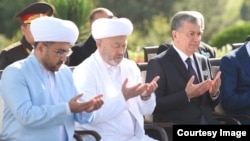Since 2005 the U.S. Commission on International Religious Freedom (USCIRF) has recommenced that the State Department designate Uzbekistan as a "Country of Particular Concern.”
That recommendation matters because, if implemented by the executive branch, can bring the imposition of U.S. sanctions in its wake. In making those recommendations, the Commission has argued that basic rights in this country have been systemically abused. But this year, in its annual report, the Commission changed course.
It recommended instead that the U.S. government put Uzbekistan onto a higher-tiered "Special Watch List.” This new recommendation reflects its judgment that the Mirziyoyev Administration has made significant progress to improve the the country’s record on religious freedom.
You can watch VOA's extensive interview from 2019 with Nadine Maenza, Vice Chair of the Commission, here discussing the background to the Commission’s views of Uzbekistan, underlying challenges there, and U.S. views.
Below is the most recent conversation with Vice Chair Maenza:
What does being on the Special Watch List mean? What are the challenges for Uzbekistan now?
Nadine Maenza, USCIRF Vice Chair: A Country of Particular Concern or a CPC meets the threshold of having particularly severe religious freedom violations that are ongoing, systematic and egregious. A country being put on the special watch list means two of the three of ongoing systematic and egregious violations. At the U.S. Commission on International Religious Freedom (USCIRF), while we applaud the improvements and want to acknowledge the progress that Uzbekistan has made, we are recommending them for the Special Watch List because we know there are still severe religious freedom violations. We will continue to monitor and work with them the same way we did when they were a CPC country. While they have stopped raiding religious communities it is important that they also change their laws to reflect that. The 1998 religion law is particularly harsh, the government has been promising for a while to change that and now we actually see some improvements towards that change.
What is the best way for the U.S. to proceed with Uzbekistan? What's Washington's role?
Nadine Maenza, USCIRF Vice Chair: USCIRF recommends that Washington continue to work with the government of Uzbekistan, especially focusing on the religion law, to comply with the international human rights standards and to remove registration requirements. Washington should also press at the highest levels and work to secure the immediate release of individuals in prison for their peaceful religious activities or religious affiliations.
What is your overall assessment of the religious freedom situation across Central Asia?
Nadine Maenza, USCIRF Vice Chair: In Central Asia, we see influence coming from China to embrace increased surveillance, which is troubling, but we also see several countries engaging USCIRF and the U.S. government and looking for concrete ways that they can improve religious freedom conditions. When we find those in government that are willing to engage regarding religious freedom, U.S. government should empower them while letting them lead the process. The hard work has to be done inside the country like it is being done right now in Uzbekistan. The U.S. government can provide all sorts of support and expertise while elevating these issues at all level of dialogue within these countries. In the end, countries that offer religious freedom are also more stable and more prosperous, which is what we want for all the countries in Central Asia.

Facebook Forum